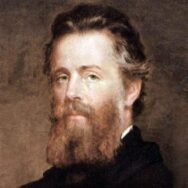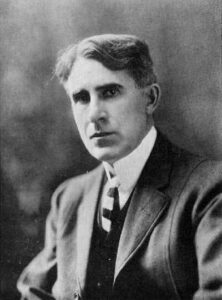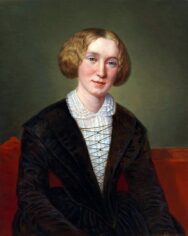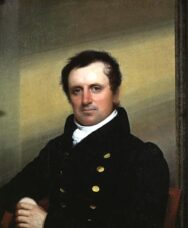 Herman Melville (1819 – 1891) was an author of the American Renaissance, or Romantic, period. Born in New York City, he was the third child of a merchant dealing in imported French goods. Shortly after the death of his father in 1832, his schooling came to an abrupt end and Melville worked as a schoolteacher before going to sea, signing on for a voyage on a merchant vessel to Liverpool in 1839. He then joined the crew of a whaler, but a year and a half into the voyage, in 1842, he jumped ship in the Marquesas Islands and spent a month living among the natives. His first novel, Typee (1846) was purportedly based on his experiences in the South Pacific. The book was hugely successful, and was quickly followed by a sequel, Omoo in 1847. The same year Melville, now a successful novelist, married Elizabeth Knapp Shaw. They would have four children, all born between 1849 and 1855. Continue reading “Herman Melville and Moby Dick”
Herman Melville (1819 – 1891) was an author of the American Renaissance, or Romantic, period. Born in New York City, he was the third child of a merchant dealing in imported French goods. Shortly after the death of his father in 1832, his schooling came to an abrupt end and Melville worked as a schoolteacher before going to sea, signing on for a voyage on a merchant vessel to Liverpool in 1839. He then joined the crew of a whaler, but a year and a half into the voyage, in 1842, he jumped ship in the Marquesas Islands and spent a month living among the natives. His first novel, Typee (1846) was purportedly based on his experiences in the South Pacific. The book was hugely successful, and was quickly followed by a sequel, Omoo in 1847. The same year Melville, now a successful novelist, married Elizabeth Knapp Shaw. They would have four children, all born between 1849 and 1855. Continue reading “Herman Melville and Moby Dick”
Category: Author Biography
Bigraphical sketches of noteworthy authors
Zane Grey: Pioneer of the “Western” Novel
 Pearl Zane Grey (1872–1939) was an American author best known for his popular western adventure novels and stories. Riders of the Purple Sage (1912) was his best-selling book, and his westerns are still widely read, with many never having been out-of-print. In addition to the perennial commercial success of his individual books, a monthly subscription book club, over 100 film adaptations, several western television series episodes and a television series, Dick Powell’s Zane Grey Theater, have been based on Grey’s novels and short stories. Continue reading “Zane Grey: Pioneer of the “Western” Novel”
Pearl Zane Grey (1872–1939) was an American author best known for his popular western adventure novels and stories. Riders of the Purple Sage (1912) was his best-selling book, and his westerns are still widely read, with many never having been out-of-print. In addition to the perennial commercial success of his individual books, a monthly subscription book club, over 100 film adaptations, several western television series episodes and a television series, Dick Powell’s Zane Grey Theater, have been based on Grey’s novels and short stories. Continue reading “Zane Grey: Pioneer of the “Western” Novel”
George Eliot: A Luminary of Victorian Era Literature
 In the history of English literature, few names loom larger than that of George Eliot. Born Mary Ann Evans on November 22, 1819, in rural Warwickshire, England, she transcended the limitations of her time to become one of the most acclaimed novelists of the Victorian era. Her life, marked by intellectual fervor, personal upheavals, and literary triumphs, is a testament to the power of intellect, empathy, and perseverance.
In the history of English literature, few names loom larger than that of George Eliot. Born Mary Ann Evans on November 22, 1819, in rural Warwickshire, England, she transcended the limitations of her time to become one of the most acclaimed novelists of the Victorian era. Her life, marked by intellectual fervor, personal upheavals, and literary triumphs, is a testament to the power of intellect, empathy, and perseverance.
Early Years and Education
Mary Ann Evans was the third child of Robert Evans, a land agent, and his second wife, Christiana Pearson. Her upbringing in the rural countryside of England instilled in her a deep love for nature, which later found its expression in her writings. Despite modest beginnings, Evans exhibited exceptional intellectual curiosity from an early age. She devoured literature voraciously, demonstrating a precocious intellect that set her apart from her peers. Continue reading “George Eliot: A Luminary of Victorian Era Literature”
An Introduction to the Life and Works of James Fenimore Cooper
 “I believe I could write a better story myself!” With these words, since become famous, James Fenimore Cooper laid aside the English novel which he was reading aloud to his wife. A few days later he submitted several pages of manuscript for her approval, and then settled down to the task of making good his boast. In November 1820, he gave the public a novel in two volumes, entitled Precaution. But it was published anonymously and dealt with English society in so much the same way as the average British novel of the time that its author was thought by many to be an Englishman. It had no originality and no real merit of any kind. Yet it was the means of inciting Cooper to another attempt. And this second novel made him famous. Continue reading “An Introduction to the Life and Works of James Fenimore Cooper”
“I believe I could write a better story myself!” With these words, since become famous, James Fenimore Cooper laid aside the English novel which he was reading aloud to his wife. A few days later he submitted several pages of manuscript for her approval, and then settled down to the task of making good his boast. In November 1820, he gave the public a novel in two volumes, entitled Precaution. But it was published anonymously and dealt with English society in so much the same way as the average British novel of the time that its author was thought by many to be an Englishman. It had no originality and no real merit of any kind. Yet it was the means of inciting Cooper to another attempt. And this second novel made him famous. Continue reading “An Introduction to the Life and Works of James Fenimore Cooper”
